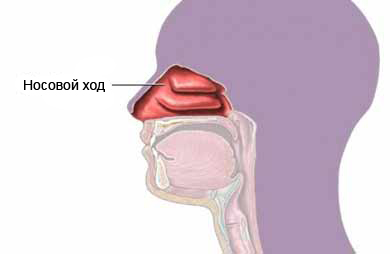Blood from the nose – Nose bleed
Description of epistaxis
Bleeding from the nose – blood, flowing from the nose or nasal passage. There are two types of nosebleeds:
- Front nosebleeds – blood flows from the front of nose, usually, semi-rigid walls, separating the two nostrils (the most common type of nosebleed);
- Rear nosebleeds – bleeding starts deep within the nose, often more difficult to treat, and is more severe, than the front nosebleeds.

Why nose bleeds?
Causes of epistaxis:
- Irritation or disruption in the nasal mucosa;
- Damage to nasal tissue, which is easier, when nasal structure is not normal or the passages are inflamed due to a cold or allergies;
- Very dry nasal tissue;
- Trauma nose;
- The presence of clots from a previous nosebleed, which damaged or torn;
- The introduction of foreign objects in the nose;
- The presence of a tumor in the nose and / or sinuses.
Risk factors for epistaxis
Factors, that may increase the risk of bleeding from the nose include:
- Irregularity in the structure of the nose;
- Abnormalities of the blood vessels in the nose (angiomy);
- The dry climate;
- Dry, Hot air in the room;
- Allergy;
- Cold;
- Sinusitis;
- Disease (eg, sarkoidoz, lupus);
- Cocaine use;
- Bleeding or clotting disorders;
- Admission anticoagulants (blood-thinning drugs), including aspirin;
- Highly high blood pressure.
Symptoms of nasal bleeding
Symptoms nosebleeds depend on, where to begin bleeding:
- Front nosebleed is manifested in the form of allocation of blood from the nostrils while in sitting or standing. If you cough or throw back his head back, Blood may pass down your throat;
- Rear nosebleed causes bleeding down the back of the mouth and throat. Blood can flow from the nostrils, If you lean forward.
When to seek medical advice when a blood from a nose?
Consult your doctor, if:
- It provided a lot of blood;
- Bleeding does not stop;
- Bleeding occurred due to injury;
- You experience frequent nosebleeds.
Diagnosis of epistaxis
The doctor will ask about your symptoms and medical history, and perform a physical exam.
They can be assigned some tests:
- Roentgen sinuses – to detect anomalies in the nasal area;
- Endoscopy, to examine nasal tissues;
- Blood tests, to check for the presence of blood anemia, low level of blood platelets, or to detect blood clotting.
Treatment of epistaxis
Most anterior nosebleeds stop without medical care within 15 minutes. Rear nosebleeds usually are more serious and need medical attention. Treatment may include blockage of blood vessels, causing bleeding.
How to stop the bleeding from the nose?
- Keep calm;
- Sit up and lean forward;
- Pinch the soft part of the nose together and hold them for at least five minutes, without weakening the pressure;
- After stopping the bleeding is not picking his nose and sniff;
- Avoid strenuous activity or heavy lifting;
- If the bleeding starts again, re-squeeze the nose for ten minutes.
Medical intervention when stopping nosebleeds
To stop the bleeding of the front The doctor uses a compress, dipped in a solution of the drug, which constricts blood vessels and reduces pain. The nostrils are compressed together. The doctor may put gauze in the nostrils. In more severe cases need to cut or cauterize a blood vessel, which is not blocked by itself.
To stop the posterior nasal bleeding It may need to be placed in the nostril gauze or a special insert and inflate the balloon, that surrendering the area of bleeding. If you attempt to stop the bleeding were unsuccessful, You may need surgery.
If you are diagnosed with a bleeding nose, Follow your doctor's instructions.
Prevention of epistaxis
To reduce the chance of bleeding from the nose:
- Lubricate dry nasal passages near the front of the nose. Apply a small amount of cream or ointment to the tip of the finger, then apply a lubricant to the inner surface of the nose. You can do this at bedtime or up to three times during the day, Using, eg, vaseline;
- Use a saline nasal spray, to keep the nasal passages moist. Check, spray that contains no drug, such as phenylephrine or oxymetazoline. These types of drugs should only be used for several days in a row;
- Do not pick your nose;
- Moisturize the air, especially in the bedroom.
